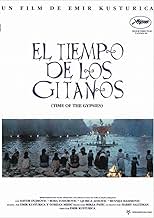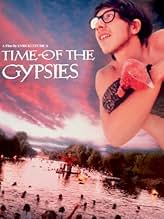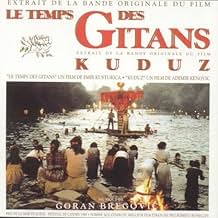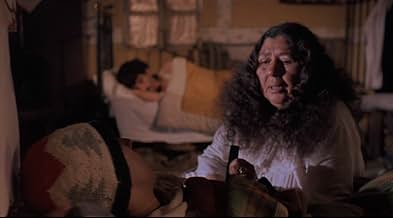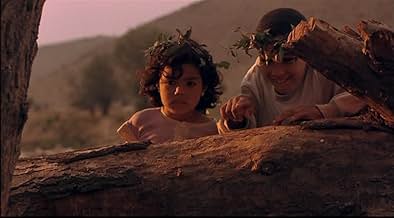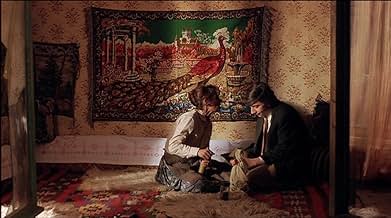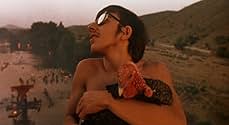In this luminous tale set in the area around Sarajevo and in Italy, Perhan, an engaging young Romany (gypsy) with telekinetic powers, is seduced by the quick-cash world of petty crime, which... Read allIn this luminous tale set in the area around Sarajevo and in Italy, Perhan, an engaging young Romany (gypsy) with telekinetic powers, is seduced by the quick-cash world of petty crime, which threatens to destroy him and those he loves.In this luminous tale set in the area around Sarajevo and in Italy, Perhan, an engaging young Romany (gypsy) with telekinetic powers, is seduced by the quick-cash world of petty crime, which threatens to destroy him and those he loves.
- Director
- Writers
- Stars
- Awards
- 3 wins & 5 nominations total
- Director
- Writers
- All cast & crew
- Production, box office & more at IMDbPro
Featured reviews
10eilgin
This movie shines as an example of pure art in cinema. So powerful with symbolism and story telling, "Time of Gypsies" delivers amazing performances on acting, settings, musical scores, and overall directing.
In year 1988, this movie was one of the most awaited films in the Istanbul International Film Festival. I was one of the lucky ones who had a ticket for the film. When the show time arrived, it was obvious that there was a problem since the film did not started. A lady from the festival committee came to the stage announcing their appology and explaining what the problem was; they were expecting the copy of the film from the its distributor in USA. Unfortunately there was a logistics problem, so they had to get it directly from Yugoslavia. When the festival organisation put their Yugoslavian translators at work they did not understand which language it was! And a cleaning lady, who was an actual gypsy figured out that the movie was in Gypsy language. So it was not possible to translate it for the festival.
So they offered an apology and refund in case anybody did not want to watch it without subtitles.
Nobody left the theatre. We watched the movie without understanding a word. But, at the end there was a standing ovation at the theatre went on for a couple of minutes.
In year 1988, this movie was one of the most awaited films in the Istanbul International Film Festival. I was one of the lucky ones who had a ticket for the film. When the show time arrived, it was obvious that there was a problem since the film did not started. A lady from the festival committee came to the stage announcing their appology and explaining what the problem was; they were expecting the copy of the film from the its distributor in USA. Unfortunately there was a logistics problem, so they had to get it directly from Yugoslavia. When the festival organisation put their Yugoslavian translators at work they did not understand which language it was! And a cleaning lady, who was an actual gypsy figured out that the movie was in Gypsy language. So it was not possible to translate it for the festival.
So they offered an apology and refund in case anybody did not want to watch it without subtitles.
Nobody left the theatre. We watched the movie without understanding a word. But, at the end there was a standing ovation at the theatre went on for a couple of minutes.
Dom za vesanje is not a movie that an average viewer can comprehend thoroughly, but this doesn't change the fact that it's a masterpiece. Emir Kusturica's storytelling requires some talent, intelligence, and flawless attention to follow and understand correctly, nonetheless it's absolutely unique and fantastic. I would never ever have thought I'd enjoy seeing the world through Yugoslavian gypsies' eyes, but it turned out to be possible so long as it's Kusturica who opens the window. Goran Bregovic's adorable tunes suit the movie perfectly fine too. This movie was one of those that strengthened my opinion which states European movies are a billion times better than American movies. Thanks to Kusturica and Bregovic for producing such a beauty. A perfect 10 for the cast as well.
This is the kind of movie I cannot forget. Well, to be honest, the reason why I watched it was to see my girlfriend, who suggested to watch it at her's. I wasn't really impressed by the movie and I thought it'd be another of those I'd forget about. And I wouldn't comment on it if there wouldn't be something special to it. I just keep thinking about it again and again, and I get the feeling it wasn't so boring as I thought. That's exactly what I find interesting. There are movies which you think are bad, and forget about them. There are movies where you see they are great and you never forget them. And there are movies which you think they haven't impressed you at all, but after some time you still think about them and you keep remembering them whether you like it or not. And eventually you find that they were quite good just the way they was. And so is this movie. What it wants to tell you is not the story it tells - a story which you may find uninteresting, longish, alien, of no matter to you. This film wants to give you an impression of the Gypsy way of life. And after seeing it and thinking about it, you feel like understanding the Gypsies somewhat more.
In Russia we have a fine 300 minutes (without kidding) DVD release of the movie (the "director's cut"?). It has its moments. The first part is hilarious and witty. The second one is absurd and insane. The third is depressing and scary. The forth is enterprising and weird. The last one is violent and tragic. To crown it all, the only reason that this feature is an outsider (it is not in IMDb top 250) seems to be the following: not many people saw it.
It doesn't look like fiction. It feels quite gritty and has very adult topics. The Gypsies look and act like Gypsies (well, at least to my taste and knowledge). There was once a serial on Russian TV called "Karmelita", where the Gypsies were shown civilized, snobbish, stylish in their dressing, good-looking, etc. They were talking and talking (in pure Russian, of course, phonetically perfect), showing a little bit more emotion than lamas (sorry my exaggeration). Personally, very thankful to my relatives that they did not spend their precious watching that never ending fiction. The title song in that "Gypsy" serial was sung by Mr Nikolay Baskov (a real "Gypsy" with blond hair). It lasted as long as 200+ parts mixed with good portion of commercials. Instead of prolonged showing of the "epic" "Karmelita" our TV should have shown "Dom za vesanje". On the other hand, they would have spoiled the whole movie by pushing commercials into it. So, let the matter rest.
The only really bad thing about "Dom za vesanje" movie seems to be the way of its DVD presentation: after the end of each part there is a kind of sketch of the next one before the credits roll over. These spoilers are not enjoyable.
Still it also has some minor drawbacks. To me they are camera-work and the absence of powerful scenery shots, i.e. the lack of the contrast and the ability to see what happens in good detail.
An 8 for this poesy of human existence in hellish surroundings will do. Thank you for attention.
It doesn't look like fiction. It feels quite gritty and has very adult topics. The Gypsies look and act like Gypsies (well, at least to my taste and knowledge). There was once a serial on Russian TV called "Karmelita", where the Gypsies were shown civilized, snobbish, stylish in their dressing, good-looking, etc. They were talking and talking (in pure Russian, of course, phonetically perfect), showing a little bit more emotion than lamas (sorry my exaggeration). Personally, very thankful to my relatives that they did not spend their precious watching that never ending fiction. The title song in that "Gypsy" serial was sung by Mr Nikolay Baskov (a real "Gypsy" with blond hair). It lasted as long as 200+ parts mixed with good portion of commercials. Instead of prolonged showing of the "epic" "Karmelita" our TV should have shown "Dom za vesanje". On the other hand, they would have spoiled the whole movie by pushing commercials into it. So, let the matter rest.
The only really bad thing about "Dom za vesanje" movie seems to be the way of its DVD presentation: after the end of each part there is a kind of sketch of the next one before the credits roll over. These spoilers are not enjoyable.
Still it also has some minor drawbacks. To me they are camera-work and the absence of powerful scenery shots, i.e. the lack of the contrast and the ability to see what happens in good detail.
An 8 for this poesy of human existence in hellish surroundings will do. Thank you for attention.
In 1933 Spanish poet and theater director Federico Garcia Lorca gave a lecture in Buenos Aires titled "Play and Theory of the Duende" in which he addressed the fiery spirit, the 'duende', behind what makes great performance stir the emotions: "The duende, then, is a power, not a work. It is a struggle, not a thought. I have heard an old maestro of the guitar say, "The duende is not in the throat; the duende climbs up inside you, from the soles of the feet.' Meaning this: it is not a question of ability, but of true, living style, of blood, of the most ancient culture, of spontaneous creation."
So okay, Kusturica has mostly come and gone by now. But for a while he really tapped into a valuable duende. I don't know how much of that translates overseas as anything more than feisty craziness, but for those of us here at least he stirred passions that go back in time. He communicated something of the very fabric of our world.
So yes, a living style. Spontaneous creation. Meaning an exaggerated depiction; but one rooted in a recognizable reality, in ancient culture. Reckless people, who consume their beings with spontaneous love or song; the Balkans, meant broadly as a peoples whose common life and toll under Ottoman rule brought them so close, wrote ourselves into this worldview long before Kusturica. Like Goran Bregovic collected old folk songs into new renditions for these films, Kusturica merely translated into cultural images. But oh so well.
Τhis is why Kusturica really spoke to common people here. He reminded them, yes with so much feisty craziness, about a struggle - not a thought - about a life they instinctively have known from blood; so hard that sometimes it makes the eyes well up with tears of joy. About a woe so deep it can only be expressed with dance or a burning cigarette to the arm. About something inexplicable that turns the soul upside down.
Two paths in life then as I see it, both valuable; we should strive to be either Zorbas or Buddhas. That is to say, to either grasp life till it hurts or dispassionately let go. It's about living life fully in the flow of it, and we either vigorously swim or we observe how it all flows away. Everything else is really half-assed stuff, merely trying to stay afloat. Kusturica made films about Zorbas.
All this is well. But if we have perhaps invested part of ourselves in cinema, the images behind, Kusturica, especially here, is a real joy to behold. There was Tarkovsky, who inspired him so much; his stare was austere like those lean Christs we find in Orthodox icons. With Kusturica, Tarkovsky's camera becomes magical song, embodying with ardor of life the joyous sadness of a world turned upside down - so much in the film is about things askew, a house suspended in the air, a man hanging himself from a bell, the image of an inverted Christ in the end.
So one masterful touch is the cinematic flow. The other is how the flow encompasses an entire life; we have a kid who grows up to see how everything in life breaks, a grownup - as this kid - who has already resigned himself to the fact and is broken himself beyond salvation, a young mother who gives birth and dies like the dead mother who is only hearsay now, a second Perhan who will grow up with only hearsay of that young mother but with a father who came back to him. Fascinating stuff, most importantly because the symbolism is not a full circle, neat, precise, but messy, rugged with life.
This is good stuff. It is just not-important enough - in the academic sense - to be really beautiful, and just incomplete enough to allow ourselves to pour into it.
So okay, Kusturica has mostly come and gone by now. But for a while he really tapped into a valuable duende. I don't know how much of that translates overseas as anything more than feisty craziness, but for those of us here at least he stirred passions that go back in time. He communicated something of the very fabric of our world.
So yes, a living style. Spontaneous creation. Meaning an exaggerated depiction; but one rooted in a recognizable reality, in ancient culture. Reckless people, who consume their beings with spontaneous love or song; the Balkans, meant broadly as a peoples whose common life and toll under Ottoman rule brought them so close, wrote ourselves into this worldview long before Kusturica. Like Goran Bregovic collected old folk songs into new renditions for these films, Kusturica merely translated into cultural images. But oh so well.
Τhis is why Kusturica really spoke to common people here. He reminded them, yes with so much feisty craziness, about a struggle - not a thought - about a life they instinctively have known from blood; so hard that sometimes it makes the eyes well up with tears of joy. About a woe so deep it can only be expressed with dance or a burning cigarette to the arm. About something inexplicable that turns the soul upside down.
Two paths in life then as I see it, both valuable; we should strive to be either Zorbas or Buddhas. That is to say, to either grasp life till it hurts or dispassionately let go. It's about living life fully in the flow of it, and we either vigorously swim or we observe how it all flows away. Everything else is really half-assed stuff, merely trying to stay afloat. Kusturica made films about Zorbas.
All this is well. But if we have perhaps invested part of ourselves in cinema, the images behind, Kusturica, especially here, is a real joy to behold. There was Tarkovsky, who inspired him so much; his stare was austere like those lean Christs we find in Orthodox icons. With Kusturica, Tarkovsky's camera becomes magical song, embodying with ardor of life the joyous sadness of a world turned upside down - so much in the film is about things askew, a house suspended in the air, a man hanging himself from a bell, the image of an inverted Christ in the end.
So one masterful touch is the cinematic flow. The other is how the flow encompasses an entire life; we have a kid who grows up to see how everything in life breaks, a grownup - as this kid - who has already resigned himself to the fact and is broken himself beyond salvation, a young mother who gives birth and dies like the dead mother who is only hearsay now, a second Perhan who will grow up with only hearsay of that young mother but with a father who came back to him. Fascinating stuff, most importantly because the symbolism is not a full circle, neat, precise, but messy, rugged with life.
This is good stuff. It is just not-important enough - in the academic sense - to be really beautiful, and just incomplete enough to allow ourselves to pour into it.
Did you know
- TriviaThe first feature to be filmed with its entire dialogue in the Gypsy language, Romany.
- ConnectionsFeatured in Horrible Reviews: Best Movies I've Seen In 2021 (2022)
- How long is Time of the Gypsies?Powered by Alexa
Details
- Release date
- Countries of origin
- Languages
- Also known as
- Time of the Gypsies
- Filming locations
- Sutka, North Macedonia(most of the film)
- Production companies
- See more company credits at IMDbPro
Box office
- Gross US & Canada
- $280,015
- Runtime2 hours 22 minutes
- Color
- Aspect ratio
- 1.85 : 1
Contribute to this page
Suggest an edit or add missing content




